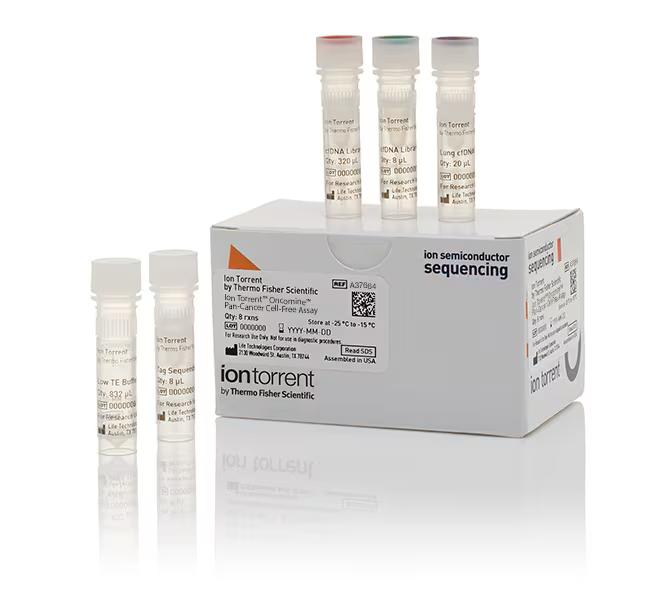
The Oncomine Pan-Cancer Cell-Free Assay is part of a complete solution to detect multiple targets in tumor-derived DNA and RNA isolated from the plasma fraction of whole blood. The assay provides the reagents and a single pool of multiplex PCR primers for preparation of an amplicon library from cell-free total nucleic acid (cfTNA) obtained from the plasma fraction of a single 10-mL tube of whole blood. This library can then be used for highly multiplexed targeted next-generation sequencing (NGS).
Oncomine cell-free assay advantages:
• From a single tube of blood, generates an amplicon library from both DNA and RNA with a detection limit of 0.1% for SNVs
• Amplicon size optimized for short cfDNA, ensuring highest possible capture rate
• Tag Sequencing technology minimizes false positives by removing randomly incorporated errors
• Optimized targeted assay design allows highly multiplexed NGS, reducing sequencing costs per sample
• Two-day workflow from single 10-mL tube of blood to report; total time to targeted libraries is just four hours
• Enables cancer genetic studies from just 5 ng of input cfTNA
• Compatible with FFPE samples for possible concordance studies
The 52-gene panel includes:
• Hotspot genes (SNVs) and short indels: AKT1, ALK, AR, ARAF, BRAF, CHEK2, CTNNB1, DDR2,EGFR, ERBB2, ERBB3, ESR1, FGFR1, FGFR2, FGFR3, FGFR4, FLT3, GNA11, GNAQ, GNAS, HRAS, IDH1, IDH2, KIT, KRAS, MAP2K1, MAP2K2, MET, MTOR, NRAS, NTRK1, NTRK3, PDGFRA, PIK3CA, RAF1, RET, ROS1, SF3B1, SMAD4, SMO
• Gene fusions: ALK, BRAF, ERG, ETV1, FGFR1, FGFR2, FGFR3, MET, NTRK1, NTRK3, RET, ROS1
• MET exon 14 skipping
• Copy number genes (CNVs): CCND1, CCND2, CCND3, CDK4, CDK6, EGFR, ERBB2, FGFR1, FGFR2, FGFR3, MET, MYC
• Tumor suppressor genes: APC, FBXW7, PTEN, TP53
These genes have been identified as frequently mutated in multiple cancer types, including: bladder, brain and CNS, breast, cervical, colorectal, endometrial, esophageal, gastric, head and neck, kidney, liver, lung, melanoma, ovarian, pancreatic, prostate, sarcoma, and thyroid.
Detection limits:
• SNVs/short indels: a limit of detection (LOD) down to 0.1% allele frequency (AF) can be achieved with a sensitivity of >80% and specificity of >98%*
• TP53 whole-target SNVs/indels: 0.5% AF (looking at all bases within amplicons)
• Fusions and MET exon skipping: LOD down to 1% can be achieved
• CNV targets: detection as low as 1.4-fold change can be achieved
The MagMAX Cell-Free Total Nucleic Acid Isolation Kit (A36716) is highly recommended for isolation of both DNA and RNA from the plasma fraction of whole blood.
Scalability and flexibility are achieved using the Tag Sequencing Barcode Set 1-24 or 25-48 (Cat. Nos. A31830 & A31847 respectively) for multiplexing barcoded samples on the Ion S5 chips.
Analysis of SNVs and short indels can be achieved using Torrent Suite Software 5.2 or higher. In order to analyze SNVs, short indels, fusions, and CNVs, Ion Reporter Software 5.6 (cloud or server based) is required.
Technology
cfDNA and cfRNA are found at extremely low concentrations in the plasma fraction of whole blood. Because of this low prevalence, a tag sequencing technology is utilized in this assay. The technology attaches unique molecular tags to the gene-specific primers. After amplification, the tagged molecules are grouped based on the tags. Groups containing the same mutant variant 80% of the time or greater will be called positive. Using this Tag technology, groups that contain random errors generated through the library construction/sequencing process are removed.
Unlike other technologies with LODs of 1-5%, the Oncomine Pan-Cancer Cell-Free Assay has a flexible detection limit down to 0.1% for SNVs or 1 mutant copy in a background of 1,000 wild-type copies. To achieve 0.1% LOD, 20 ng of input cfTNA is required. Lower amounts of cfTNA can be used, but the %LOD will be higher depending on the input amount.
Liquid biopsies offer several advantages over conventional solid tumor biopsies:
• Liquid biopsy samples are less invasive enabling them to be taken at multiple time points to monitor progression of the cancer
• Lower cost compared to traditional tissue biopsies
• Faster turnaround time from sample to results
• Better represent tumor heterogeneity
*Sensitivity and specificity for each variant type were determined using a collection of contrived positive samples and cfTNA isolated from normal healthy donors.
| Code | Description |
|---|---|
| A37664 | Catalog Number: A37664 |

